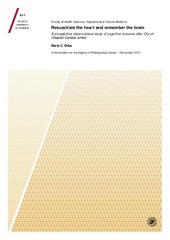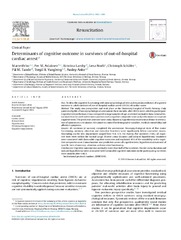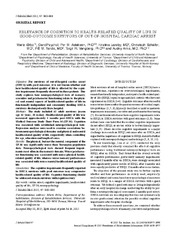| dc.contributor.advisor | Anke, Audny | |
| dc.contributor.author | Ørbo, Marte Christine | |
| dc.date.accessioned | 2016-08-26T07:47:27Z | |
| dc.date.available | 2016-08-26T07:47:27Z | |
| dc.date.issued | 2016-06-03 | |
| dc.description.abstract | Cognitive outcome after out-of-hospital cardiac arrest
Aim: To investigate long-term cognitive outcomes after survival from Out-of-Hospital Cardiac Arrest (OHCA) with neuropsychological assessment methods. Background: OHCA may cause cognitive impairments and functional disability due to hypoxic-ischemic brain injury. Methods: Cognitive functions, health-related quality of life and affective symptoms were assessed at 3 and 12 months after resuscitation. Forty-eight survivors were prospectively included according to favorable outcome characteristics. Main results: At 3 months assessment cognitive tests for memory-, executive- and psychomotor functions were significantly impaired compared to normative population data. Longer coma duration was associated with poorer cognitive outcomes. Poorer cognitive outcomes was associated with worse reports of health-related quality of life. Few survivors reported symptoms of anxiety or depression. Minor changes in outcome measures were detected from 3 to 12 months. Less than half had cognitive impairments. Cognitive impairments were most often mild. Conclusions: OHCA survival is compatible with return to premorbid functioning and good health-related quality of life. However, cognitive functions should be assessed systematically after resuscitation to target the survivors that are in need of further rehabilitation interventions. | en_US |
| dc.description.doctoraltype | ph.d. | en_US |
| dc.description.popularabstract | 1: Hjernen bør også undersøkes etter gjenopplivning
2: Etterundersøkelse av kognitive funksjoner og psykisk helse bør tilbys overlevere etter hjertestans utenfor sykehuset.
3: Forskningsprosjektet undersøkte kognitive funksjoner, psykisk helse og helserelatert livskvalitet tre og tolv måneder etter hjertestans hos 48 deltakere. Noe under halvparten hadde ingen kognitive problemer og få rapporterte psykiske plager 3 og 12 måneder etter hjertestans. Alle hjertestansoverleverne som ble valgt ut for undersøkelsen fungerte godt i sitt dagligliv før hjertestans, og var psykisk og rimelig fysisk friske. Det var derfor noe overraskende at såpass mange hadde problemer. Vi fant ut at tiden fra hjertestans til pasienten våknet fra koma var assosiert med grad av kognitiv funksjonssvekkelse etter 3 måneder. Hjertestansoverlevere med dårligere kognitiv funksjon identifisert ved 3 måneder rapporterer mer fysiske, psykiske og sosiale hinder i sitt dagligliv. Liten endring ble funnet i resultatene fra 3 til 12 måneder. Kognitiv svikt identifisert ved 3 måneder reduserte sannsynligheten for å vende tilbake i jobb det første året etter hjertestans. Resultatene viser at flere hjertesansoverlevere har kognitive og emosjonelle problemer enn det vi visste om før vi begynte å følge dem opp systematisk. Parallelt med forskningsprosjektet er det derfor utviklet et oppfølgingstilbud til alle de som overlever prehospital hjertestans på UNN Tromsø.
4:Kontaktinfo
Marte C. Ørbo
Universitetssykehuset Nord Norge
Avdeling for Rehabilitering, NOR klinikken
9038 Tromsø
marte.orbo@hotmail.com/marte.orbo@unn.no
Mobil 97167243 | en_US |
| dc.description.sponsorship | Ekstrastiftelsen Helse og Rehabilitering, Universitetssykehuset Nord-Norge. Helse Nord. | en_US |
| dc.description | Paper III of this thesis is not available in Munin. <br>
Paper III: Ørbo, M, Aslaksen, P. M., Larsby, K., Schäfer, C., Tande, P. M., Anke, A.: «Does cognitive outcome change from 3-12 months in survivors from out-of-hospital cardiac arrest?" (Manuscript). | en_US |
| dc.identifier.uri | https://hdl.handle.net/10037/9568 | |
| dc.identifier.urn | URN:NBN:no-uit_munin_9126 | |
| dc.language.iso | eng | en_US |
| dc.publisher | UiT The Arctic University of Norway | en_US |
| dc.publisher | UiT Norges arktiske universitet | en_US |
| dc.rights.accessRights | openAccess | |
| dc.rights.holder | Copyright 2016 The Author(s) | |
| dc.rights.uri | https://creativecommons.org/licenses/by-nc-sa/3.0 | en_US |
| dc.rights | Attribution-NonCommercial-ShareAlike 3.0 Unported (CC BY-NC-SA 3.0) | en_US |
| dc.subject | Nevropsykologi | en_US |
| dc.subject | VDP::Samfunnsvitenskap: 200::Psykologi: 260 | en_US |
| dc.subject | VDP::Social science: 200::Psychology: 260 | en_US |
| dc.subject | Neuropsychology | en_US |
| dc.title | Resuscitate the heart and remember the brain. A prospective observational study of cognitive outcome after Out-of-Hospital Cardiac arrest | en_US |
| dc.type | Doctoral thesis | en_US |
| dc.type | Doktorgradsavhandling | en_US |


 English
English norsk
norsk


